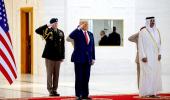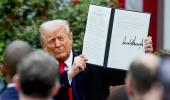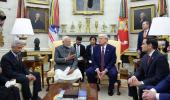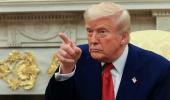'In the Indian government there are no illusions about the United States reliability or the possibility of having any kind of preferential treatment from Washington when it comes to trade.'

The disruption across economies due to US President Donald Trump's tariff has nudged countries, including India, to negotiate a plethora of trade deals.
Claude Smadja, former managing director, World Economic Forum and now chairman of Smadja & Smadja Strategic Advisory who will be hosting the India Global Innovation Connect in June in Bangalore with focus on AI, speaks to Surajeet Das Gupta/Business Standard on a video call on how he reads the new global business realities.
The tariff challenge by the US has disrupted the world economy and heightened US-China tensions. Where do you think is the end of the road?
It is very difficult to tell where this will lead to because of the unpredictability of Trump and his administration.
But the fact is the US today is in a much weaker position than it was during the first Trump administration.
It faces huge budget deficits, its technology edge is being eroded and it is a country which is extremely polarised and its relationship with traditional allies under cloud.
At the same time, it is quite clear that despite appearances when talking about China's structural difficulties, it is today stronger than it was during the first Trump presidency.
And so I think what we are seeing today is that some people in the Trump administration are beginning to realise that they will have to come to terms with China and that there will have to be an agreement.
That is because there is a very strong risk for America to be on the losing side in the test of will with China.
So I think it would not be surprising to see some accommodation happening in the next few weeks between Washington and Beijing to a kind of, at least on the surface, easing of tensions.
So what should India's strategy be in this scenario?
Trump, as has been said so often, is a transactional man. He has no allies. He has no enemies. He has no friends.
He has just interlocutors from whom he wants to extract the maximum from their part.
In the Indian government there are no illusions about the United States reliability or the possibility of having any kind of preferential treatment from Washington when it comes to trade.
So, the Modi government has been accelerating negotiation and discussion to create more free trades and economic agreements, to diversify the economic technological business relationship.

Do you see Europe in decline? And what does it mean for India which is negotiating a free trade deal with the EU?
We believe that Europe is in a decline, which, except for some kind of revolutionary reversal, would be irreversible.
It has been accelerated due to the stupid policy with respect to the Ukraine war and the situation is that Europe today is more dependent on the United States and is in a weak position compared to China.
I can understand that it is in the interest of India to try to expand the economic relationship with Europe, but I think there should be a realisation about the limitations.
Do you think a bilateral trade agreement with the EU can be signed up quickly as it envisaged?
There are limits of what can be achieved. And I don't think it will happen in the time frame mentioned by India and Brussels. Europe is very Eurocentric.
You will have in Europe a number of lobbies with interests in many domains where they are looking for protection.
This can be seen in the automotive industry where India has developed capabilities, in the pharma and biotech industry where a lot of obstacles will be raised.

India also wants to sign a bilateral agreement with the US as quickly as possible. What is your view on it?
That is the thinking in the government. But I do believe that a kind of accelerated tempo to achieve an agreement will play in the hands of a Trump administration.
For instance, India has shown that the concept of digital sovereignty is very important to this country.
I do believe that the people around Trump consider that digital sovereignty is anathema for American digital supremacy.
But I do believe that there has been a big missed opportunity when India decided not to join the regional comprehensive economic partnership agreement.
Trump is playing with all the countries with which he is trying to negotiate, which is to say, okay, if you don't want to suffer from tariffs, come and produce in my country.
What do you think is the reason why India is finding it difficult to leverage the China Plus strategy like Vietnam?
There are a number of prerequisites which India does not meet to be able to play this strategy fully.
One of them is the necessity of bureaucratic simplification and streamlining which still remains a significant area for companies to look at India as a replacement to China.
The second thing is despite all the progress which has been made in the last five or seven or 10 years, it doesn't have the kind of efficiency of supply chains which have made China unbeatable in many domains.
That is where Vietnam has been more successful.
Feature Presentation: Aslam Hunani/Rediff.com











